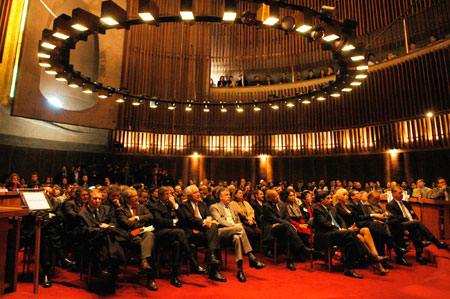"We Are Witnessing the Gradual Mutation of Political Sovereignty"
Topic(s)
The Vice President of the Plurinational State of Bolivia spoke on the role of the State and the structural changes in his country.

(24 June 2010) "Today, Bolivia vindicates, advocates and begins to build what we have called a plurinational State, a communitarian social economy and a process of decentralization of power by means of departmental, indigenous and regional autonomies. It is a complex State," said today the Vice President of the Plurinational State of Bolivia, Álvaro García Linera, during a master lecture at ECLAC headquarters in Santiago.
The Bolivian official spoke on Power, the State and Socialism in Contemporary Bolivia in which he addressed the definition of the State, its role in development and the process of structural changes taking place in Bolivia since President Evo Morales took office in 2006.
García Linera was received at ECLAC by the Executive Secretary of the Commission, Alicia Bárcena, and the Director of the Latin American Faculty of Social Sciences (FLACSO-Chile), Andrés Solimano.
In his lecture, the Vice President of Bolivia spoke of the different views currently being discussed on the role of the State and its relation to supranational institutions and mechanisms that restrict national decisions and policies on the economy, finances and legal definitions, among other aspects.
"Is it possible to aim for a model of economic development that gives back the State greater capabilities for obtaining resources to distribute and guarantee health, education, transportation and basic services to its citizens?" asked García Linera. "These are structural issues that haven't been resolved over the past 180 years in Bolivia [...] It is no coincidence that ECLAC vindicates a strong State to work towards equality."
In her presentation prior to the lecture, Alicia Bárcena asserted that the State has a decisive role to play in correcting inequality. "To do this, the State has to be provided with more capabilities to redistribute resources and promote equality. We are talking about a welfare State, not a subsidiary State, which can advance towards a tax structure and transference system that privileges social solidarity," she said.
"The evidence shows - she added - that the 'Latin American and Caribbean State' has often been slow, bureaucratic, unprofessional and co-opted by private or corporate interests. That is not the State we need. Our proposal demands a State that intervenes to redistribute, regulate and supervise, aiming for equality. Doing this requires a strong emphasis on State reform and modernization: a democratic, transparent State that can be held accountable."
However, noted García Linera, some people believe that the State is en route to extinction along with the supposed self regulation of markets and the creation of supranational mechanisms.
Others say that the State has not lost its importance as a means of territorial cohesion, but, he said, "this ignores the fact that there are a series of mechanisms that operate outside the State, leaving certain economic, political and legal decisions out of its realm, like the price of commodities and food," said García Linera.
"Therefore, we are not witnessing the suppression of the role of the State nor the petrification of the sovereignty of the State. We are before the gradual mutation of political sovereignty," he stated.
After describing what he defined as the main historic structural failures in Bolivia, García Linera outlined his government's achievements in social, economic, legal and political equality.
"Today we feel proud of vindicating the dimension of equality in our country. We vindicate the importance of the State, but not a suffocating State: one with a mixed economic regime that continues to work with the private sector and foreign markets, but also takes care of domestic demand and the rights of its citizens," he stated.
See also:
For enquiries, please contact ECLAC's Public Information and Web Services Section. Email: dpisantiago@cepal.org; telephone: (56-2) 210-2040/2149.
Related content
Visita del Vicepresidente del Estado Plurinacional de Bolivia, Álvaro García Linera
Por Alicia Bárcena, Secretaria Ejecutiva de la CEPAL
Country(ies)
-
Bolivia
Contact
Public Information Unit
- prensa@cepal.org
- (56 2) 2210 2040